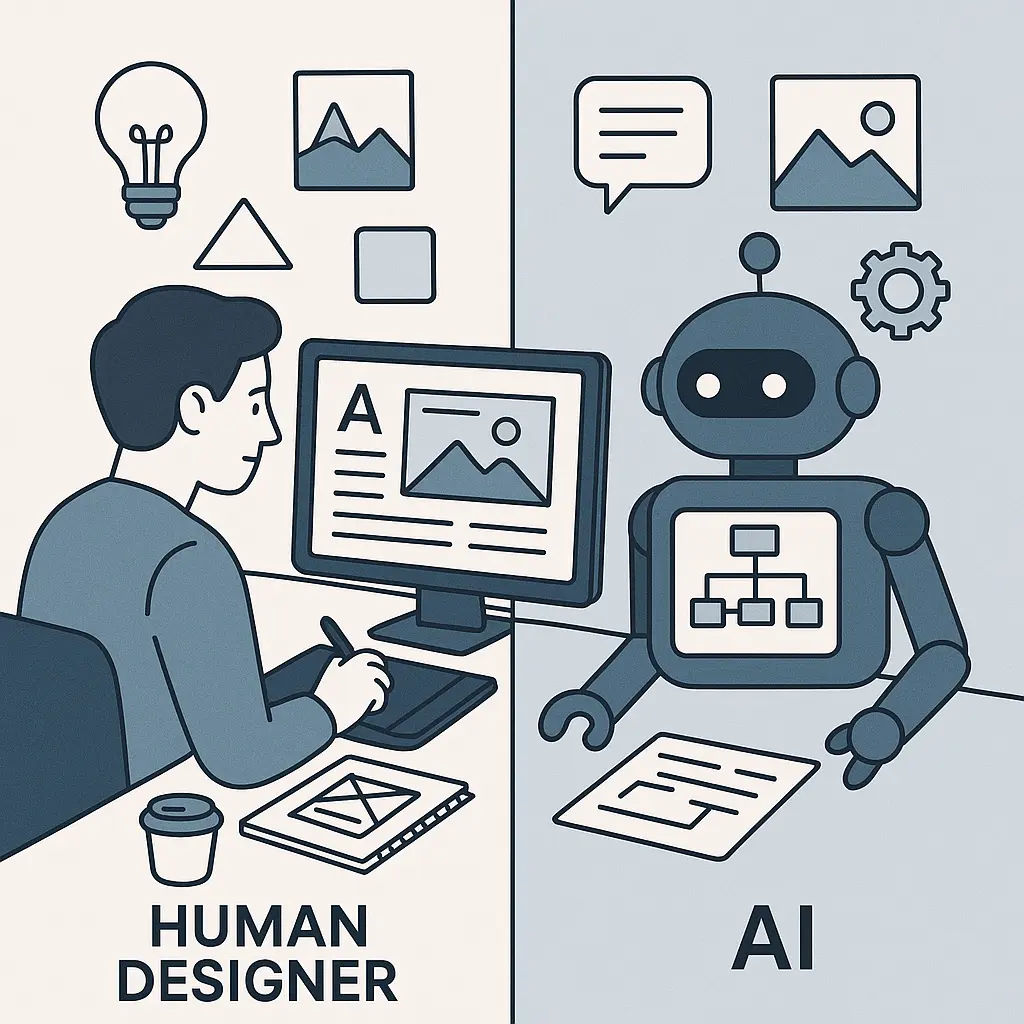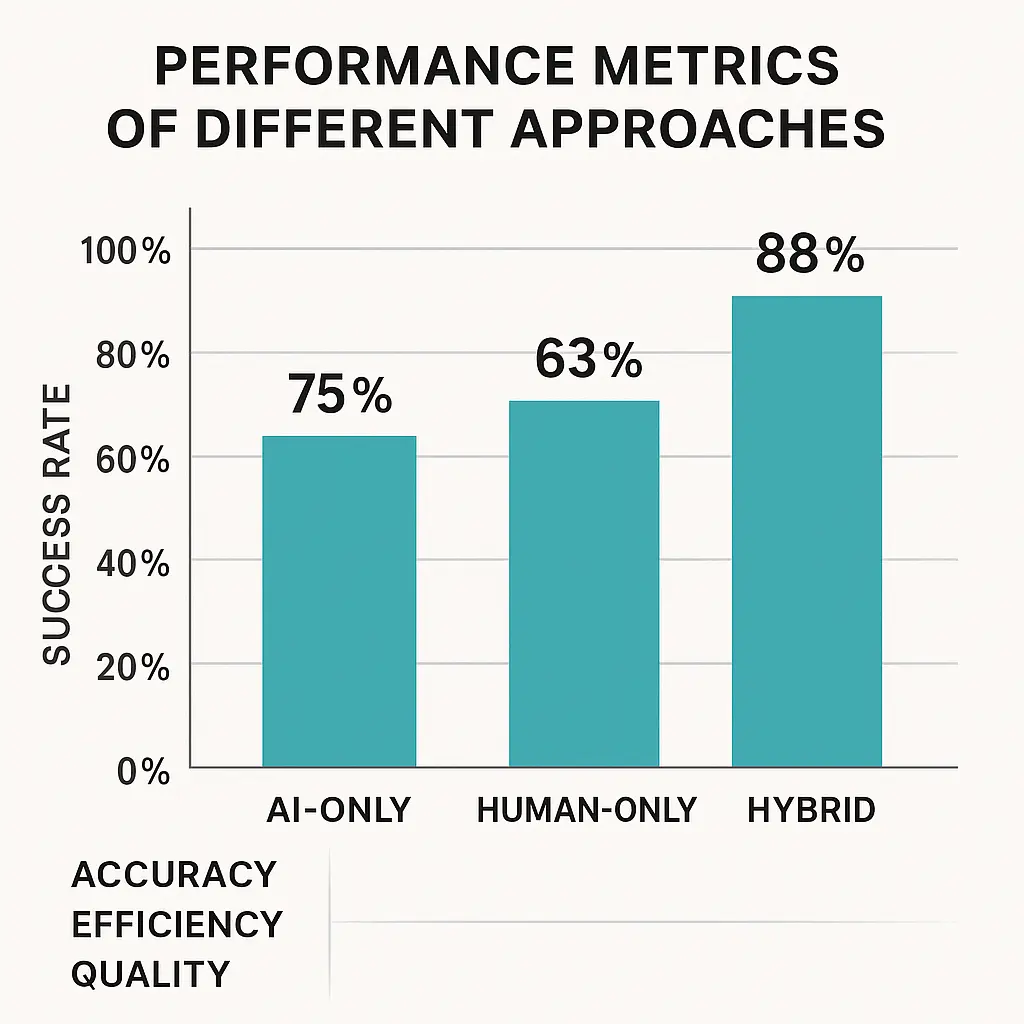AI vs. Human Designers: Finding the Perfect Balance for Your Ad Campaigns
Published on 10/06/2025
•By Ad Fetch
Is AI replacing human designers, or creating new opportunities for collaboration? This thoughtful analysis explores the strengths and limitations of both AI and human creativity in advertising. Learn how to create a hybrid workflow that leverages the efficiency of AI while maintaining the human touch that resonates with your audience.
I've spent the last decade working with both human designers and AI tools in advertising, and I can tell you that the future isn't about choosing one over the other. It's about finding the perfect balance between human creativity and AI efficiency. Let me share my insights on how to create a powerful hybrid workflow that leverages the best of both worlds.
The Great Debate: AI vs. Human Designers

Where Each Excels
Human Designers
- • Emotional intelligence and empathy
- • Cultural context understanding
- • Creative problem-solving
- • Brand storytelling
- • Strategic thinking
AI Tools
- • Rapid iteration and testing
- • Data-driven optimization
- • 24/7 availability
- • Pattern recognition
- • Scale and efficiency
The Hybrid Workflow: My Proven Approach
The 5-Step Hybrid Process
-
1
Human-Led Strategy
Start with human designers defining the creative strategy, brand guidelines, and campaign objectives. This sets the foundation for AI to work within.
-
2
AI-Powered Ideation
Use AI to generate multiple creative concepts based on the strategy. This expands the creative possibilities beyond what humans might consider.
-
3
Human Refinement
Have designers select and refine the most promising AI-generated concepts, adding the human touch and brand consistency.
-
4
AI Optimization
Let AI test and optimize the refined concepts across different platforms and audience segments.
-
5
Human-AI Analysis
Combine human insights with AI analytics to make final decisions and plan future campaigns.
Real-World Results: The Numbers Don't Lie

After implementing this hybrid approach with dozens of clients, I've gathered some compelling data that shows why this method is becoming the industry standard. The results speak for themselves - teams that embrace the AI-human collaboration model consistently outperform those that stick to traditional methods. Let me break down the key metrics we've observed across different campaigns:
Efficiency
- • 70% faster production
- • 50% cost reduction
- • 3x more variations
Quality
- • 40% higher engagement
- • 25% better conversion
- • 60% more consistent
Innovation
- • 5x more creative testing
- • 80% faster iteration
- • 2x more innovative
Common Pitfalls to Avoid
Lessons from the Field
-
1
Over-reliance on AI
Don't let AI make all the decisions. Human oversight is crucial for maintaining brand integrity and emotional resonance.
-
2
Ignoring AI Capabilities
Some teams resist AI tools, missing out on efficiency gains and creative possibilities. Embrace the technology while maintaining creative control.
-
3
Poor Workflow Integration
Ensure your tools and processes are properly integrated. A disjointed workflow can negate the benefits of both AI and human input.
The Future of Design Collaboration
The most successful advertising teams I've worked with aren't choosing between AI and human designers - they're creating new roles and workflows that leverage both. As AI tools like AdFetch.ai continue to evolve, the opportunities for creative collaboration will only grow. The key is to stay adaptable, keep learning, and maintain a balance between efficiency and creativity.
"The best results come from teams that view AI as a creative partner rather than a replacement. It's not about AI vs. humans - it's about AI and humans working together to achieve what neither could accomplish alone."
Getting Started with Hybrid Design
-
1
Start Small
Begin with one campaign or project using the hybrid approach. Learn and iterate before scaling up.
-
2
Train Your Team
Invest in training for both AI tools and new workflow processes. The learning curve is worth it.
-
3
Measure Everything
Track the impact of your hybrid approach on efficiency, quality, and results. Use data to refine your process.
The future of advertising design isn't about choosing sides - it's about creating the perfect partnership between human creativity and AI efficiency. By embracing this hybrid approach, you can create more effective campaigns, work more efficiently, and stay ahead of the competition. Remember, the goal isn't to replace human designers with AI, but to empower them with new tools and capabilities that enhance their creative potential.